How to earn $ 80,000 on the App Store
It is easier than you think: you need neither luck nor perseverance.
At the WWDC conference, Apple reported that they had already paid developers $ 70 billion, with 30% of this amount (ie, 21 billion!) Accounted for last year. Such a sharp jump surprised me: I would not say that my friends and I began to spend more on applications lately. But this is only my personal experience, so I wondered: where did this revenue come from? I opened the App Store and began to view a list of the most profitable applications.
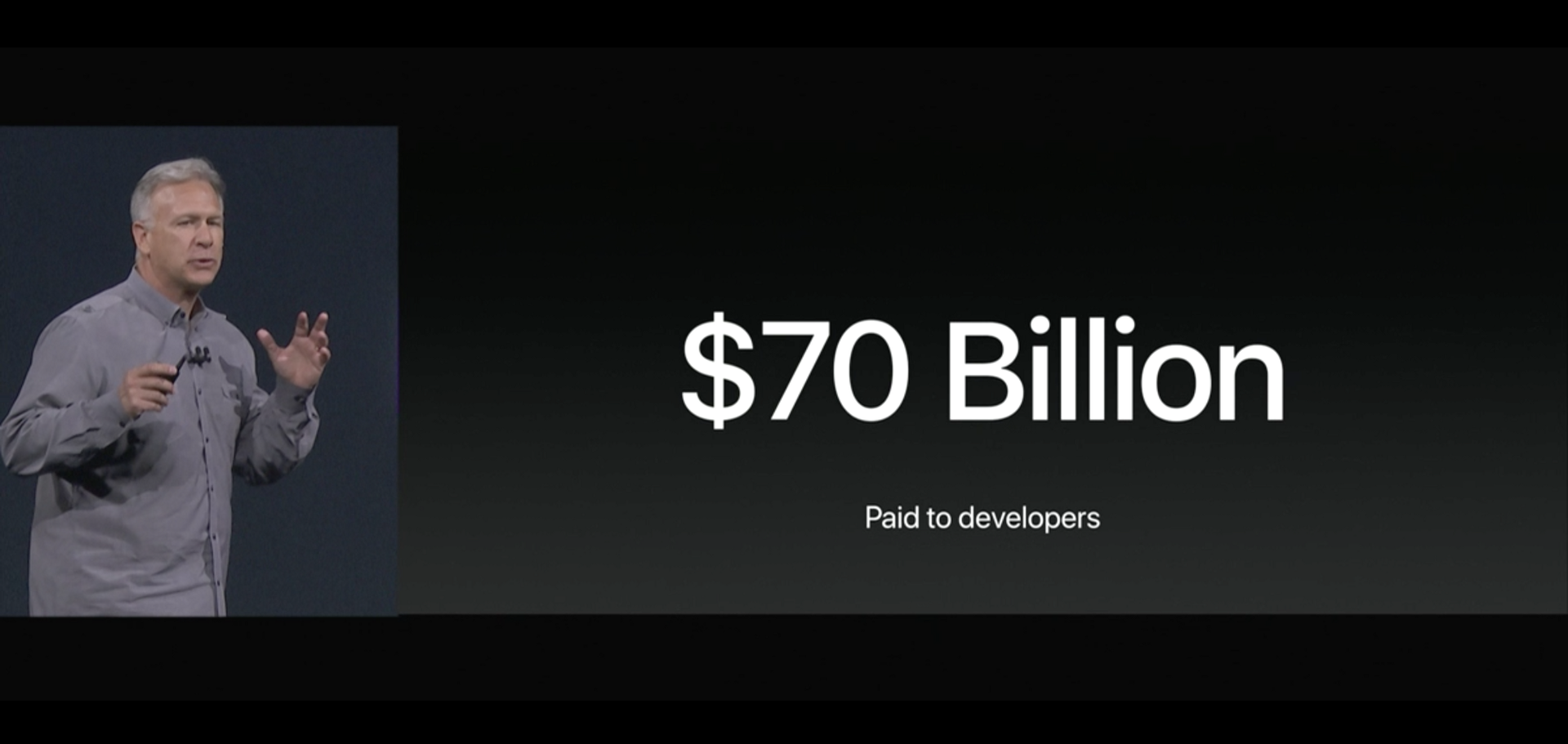
')
Scrolling through the list in the Performance category, I saw applications from well-known companies such as Dropbox, Evernote, and Microsoft. No wonder. Stop, what's this? The tenth position in the list of the most profitable productivity applications (rating of June 7, 2017) was occupied by an application called “Mobile protection: Clean & Security VPN”.
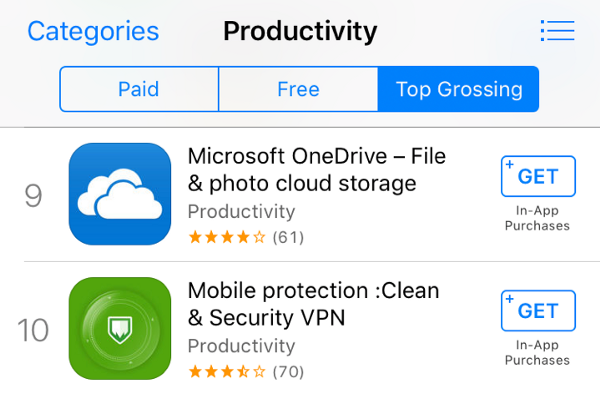
The terribly well-formed name (capital letters mixed with lowercase, a colon that had slipped, clumsy grammar) suggested that there was a failure in the search algorithm. So I went to the Sensor Tower to see how much the application collected, and I saw ... $ 80,000 per month ?! Now it became really interesting to me.
I went to the application page and saw that as the developer Ngan Vo Thi Thuy is declared. Wait, so this is a VPN service from an independent developer who didn’t even bother to register a company? This is a serious reason for doubt. For those who do not understand what is wrong with this, I will explain: VPN, in fact, passes all your traffic through a third-party server. In our case, it turns out that some incomprehensible person who is not able to correctly formulate the name and was too lazy to register a company wants to get access to all your Internet traffic.
There was another alarm bell - gibberish in the description:
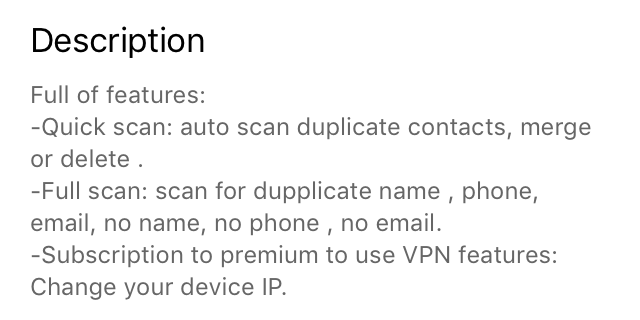
Here it is stated that in Mobile protection: Clean & Security VPN “heap of functions” - yes, “heap” is the right word here. It turns out that “mobile protection” includes protection against duplicate contacts. And this search for duplicates, as they say in the screenshots, consists of "fast and full scan Internet security." I give five Internet to someone who will explain to me what is the connection between Internet security and duplicates in contacts.
A lot of suspicious signs - but I haven't even downloaded the application yet. I went to the tab with reviews and found a few vague, obviously custom reviews with a rating of five stars:
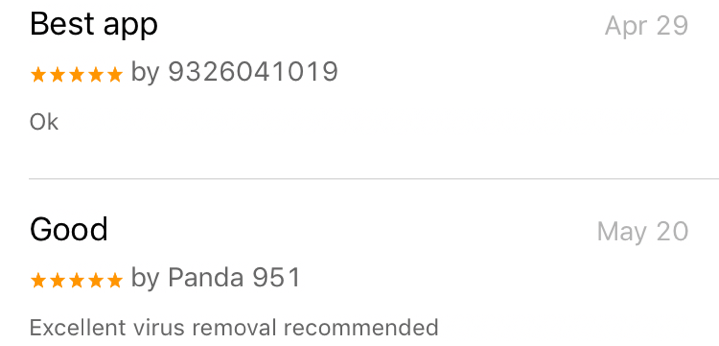
The dates of these reviews gave me another question: when was the app published? According to the Sensor Tower, Mobile protection: Clean & Security VPN was among the twenty most profitable applications starting at least from April 20, 2017 (that is, almost two months).
Intrigued by this supposedly golden application, I downloaded it onto the phone. Here is what happened when I launched it for the first time:
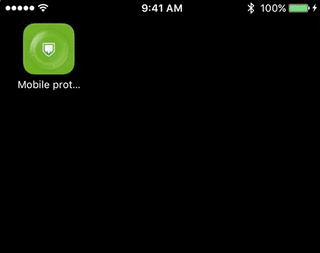
Yes, “The application needs access to your contacts to perform a search.” And all I can do is click on the “Agree” button, after which the system asks if I want to provide access to the contacts. Uh, no, thanks.
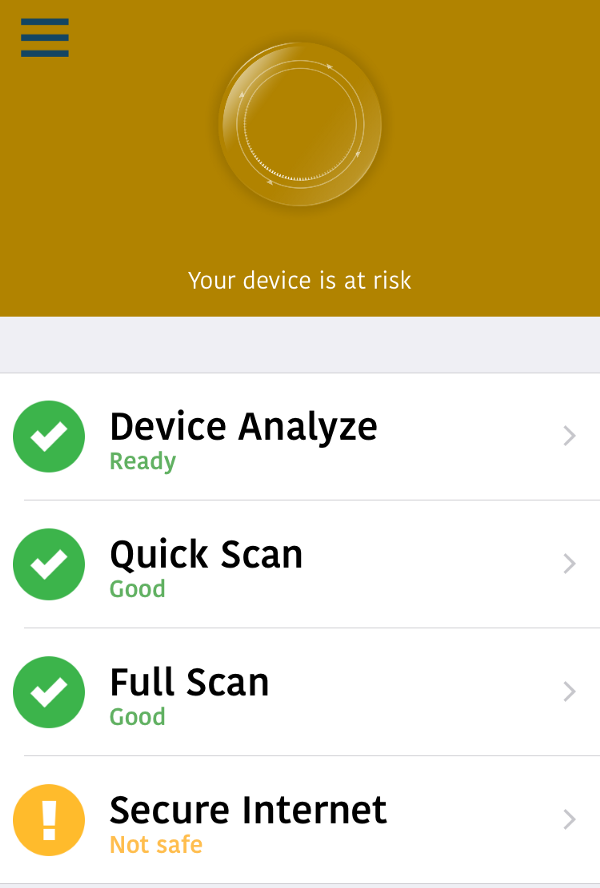
Having received a refusal, the application informs me that my device is under threat. Still would! It expresses its readiness to “analyze the device”, conduct Full or Fast Scan and secure the Internet for me (I can’t wait).
Clicking on Device Analyze displays information about how much memory is left on the iPhone - a useless function that has no relation to security.
If you click at least Full, at least the following message appears on the Quick Scan:
“Your contacts have been cleared. No duplicates found. ”
Perfectly. No duplicates, except for the extra "l" in the word "duplicates", of course.
Well, now let's finally secure the Internet for me by clicking on the appropriate button. Well, well, what do we have here?
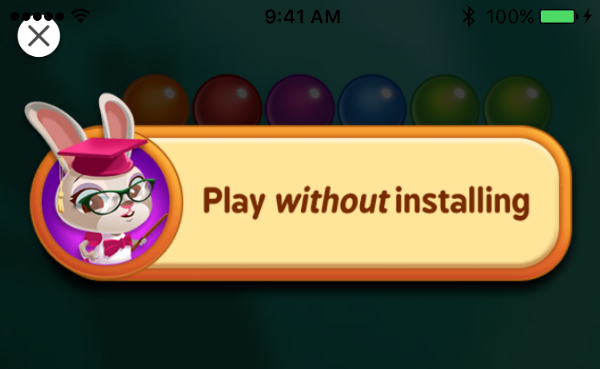
On the screen there appears this incredibly generous offer to play the game - to shoot at the balls. It does not even need to install! I do not know why I won such a wonderful gift, but I will have to postpone it until better times. I click on the cross to return to my mission to secure the Internet.
On the next screen I see the following picture:
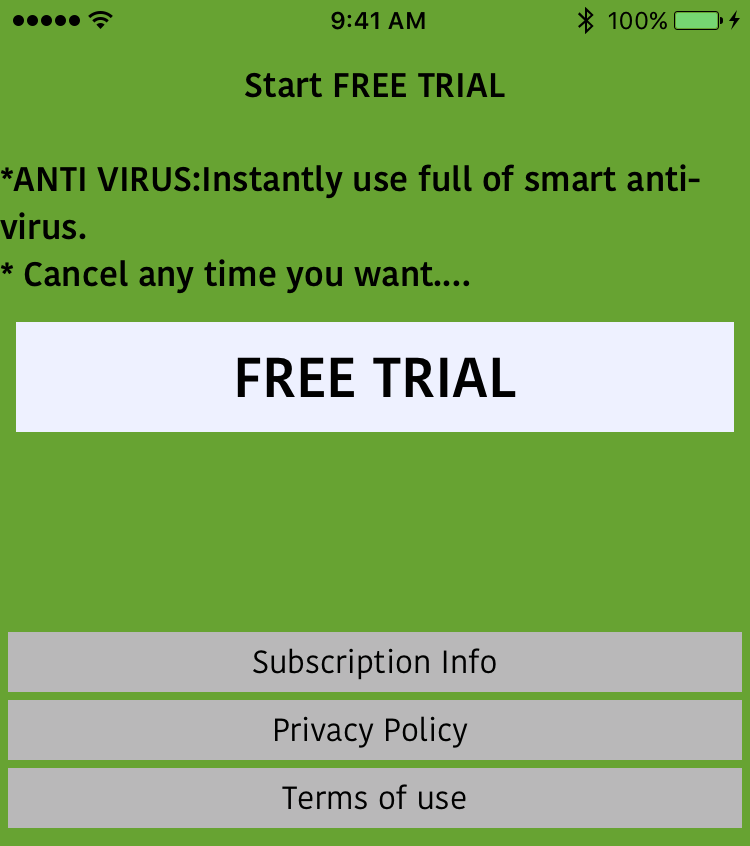
Naturally, I can not miss the opportunity to get "Full access smart anti-virus right now" and click on the "Free trial" ("Start free"). Free same!
Touch ID? No problem! Stop ... what's written in small print?
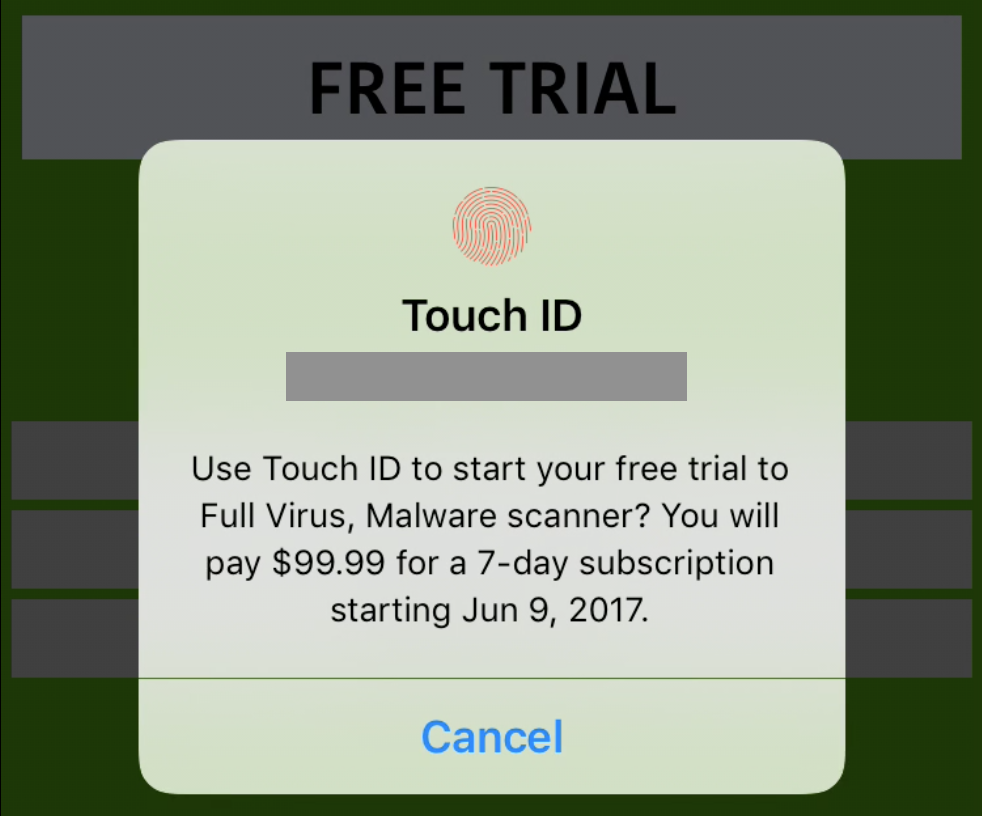
"Full Virus, Malware scanner" ("Full scan for viruses, malware"). What? As far as I know, no third-party application can check my iPhone for viruses, since access to files from them is limited to the sandbox - its own working directory. But let's read to the end.
"Weekly subscription will cost $ 99.99"
Er ... in a sense?
Somewhere in the depths of the wall of the text, in small print, iOS in between times informs me that with one click on the Home button I will agree to purchase a $ 100 subscription. And it would be half the trouble, but $ 100 from me will be taken weekly! A single Touch ID separated me from giving $ 400 per month subscription to a scammer who would redirect my traffic?
What can I say, thank God that I read everything that was written in small print. But will everyone be so careful?
Now, the fact that the application collects revenue of $ 80,000 per month, suddenly began to look quite logical. If each subscriber brings in $ 400 per month, you need to cheat only 200 people in order to receive $ 80,000 per month and, accordingly, $ 960,000 per year.
You may still be skeptical. You probably think: “Well, yes, 200 people are not so much, but somehow I can’t believe that someone will download such a questionable application at all, not to mention paying for it.”
You might not be. I wouldn't do that. But I never click on an ad on Google, and yet, the Adwords service somehow brought the company 700 billion dollars today. Mobile protection: Clean & Security VPN is ranked 144th in the Performance category in the App Store rating by downloads, with about 50,000 downloads in April alone.
To get 200 subscribers with 50,000 downloads, a conversion level of 0.4% is enough - or even less, because subscriptions are renewed automatically, so customers accumulate from month to month. Can't you imagine that any of your relatives who are not technical-minded accidentally (or even intentionally) signed up for a “free” subscription to protect their ipad from viruses?
But how did this application manage to collect 50,000 downloads at all?
I remembered reading somewhere: apps from the App Store are mainly found through an internal search on the market. Perhaps for this application simply performed ASO at the highest level? I drove into the search line on the market "virus scanner".
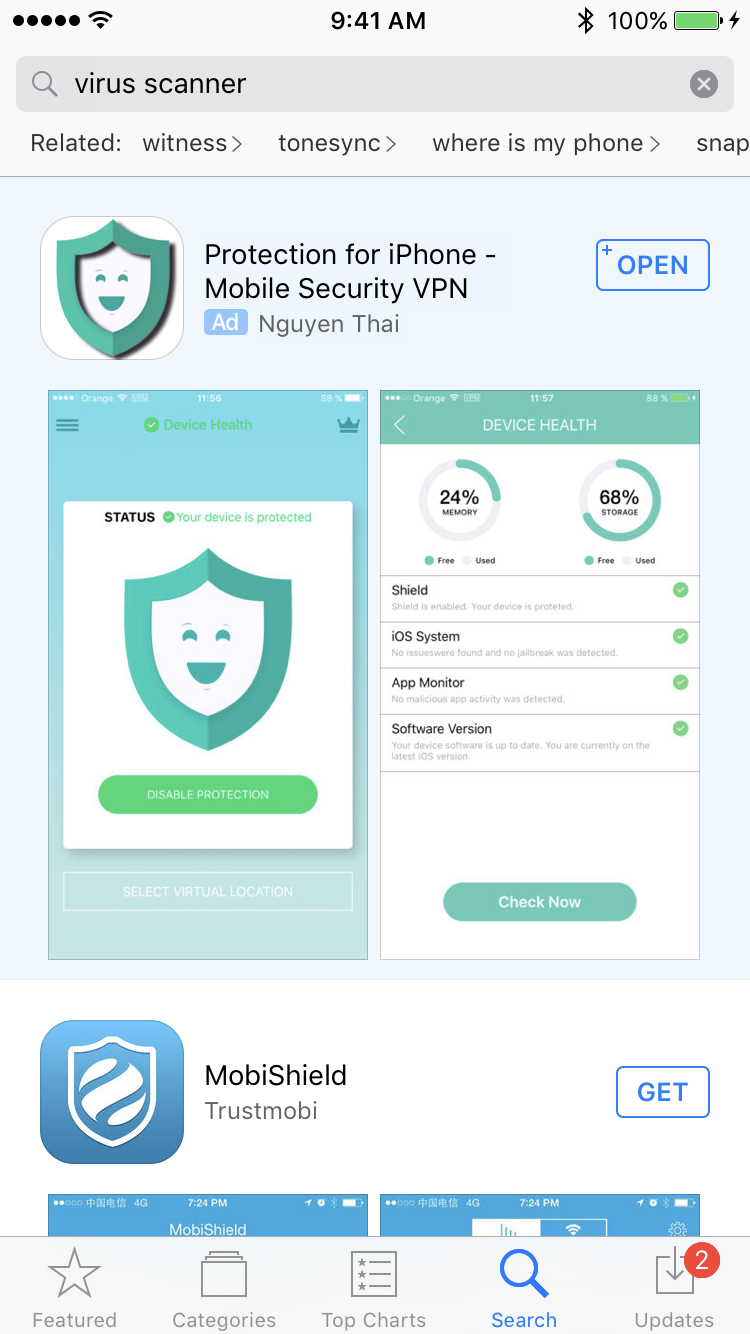
The first in the issue of advertising is for Mobile Protection VPN. There is something familiar about him. This is not a clone of the one we are considering, but it contains the built-in purchase of “Free Trial to Premium Protection”, which costs $ 99.99 and occupies the 33rd position among the most profitable in the “Business” category.
As it turns out, scammers are abusing Apple’s new, unpolished tool - App Store Search Ads. They use the fact that the advertised applications do not pass the selection and are not moderated, they differ little in appearance from the usual search results and in some cases occupy the entire first page of search results.
Later, I studied this topic in more detail and made sure that, unfortunately, these are not isolated cases - such applications are regularly found in the top profitable. And they are not concentrated only in issuing on security-related requests. It seems that fraudsters are betting on a wide range of keys. Here is the issue for the request "wifi":
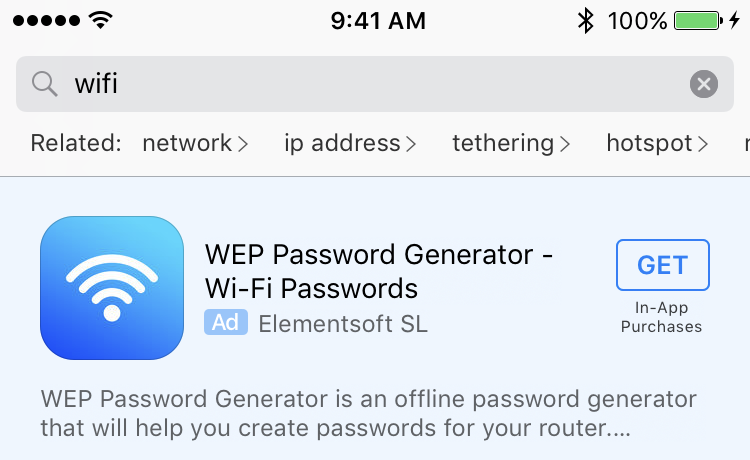
On the very first line is WEP Password Generator, the usual random password generator, which charges users $ 50 a month. Thus, he collects $ 10,000 a month already, although he entered the market only in April. By all indications, this is a clone of another application , from which we can conclude: this scheme has become so popular that fraudsters have already begun to copy each other.
Let's start with the fact that if you are a developer who is not too burdened by moral norms, then congratulations! You just learned a way to earn tens of thousands of dollars on the App Store without much difficulty — at least until they change the policy. If not, then I can advise the following:
Somehow it is hard to believe that Apple is still not aware of the problem; After all, the applications that were discussed are not a trifle, they generally occupy high positions in the ratings. Perhaps the company simply believes the situation is not serious enough to waste time on it, either too profitable for Search Ads or the App Store platform. In any case, here is what I would suggest:
Mobile application developers take pride in the fact that people are willing to pay for their products, if they bring some kind of benefit or somehow make life easier - in the end, everyone will benefit. Moreover, building applications requires design and engineering skills, commercial talent, as well as perseverance and hard work.
Therefore, in addition to using someone's ignorance for your own benefit, it is unethical, it also demotivates developers. Hands down when you think that someone is achieving financial success in a simple and immoral way - making dummy applications that can be written in a few hours and which have just enough functionality to steal money from those who are easily deceived.
At the WWDC conference, Apple reported that they had already paid developers $ 70 billion, with 30% of this amount (ie, 21 billion!) Accounted for last year. Such a sharp jump surprised me: I would not say that my friends and I began to spend more on applications lately. But this is only my personal experience, so I wondered: where did this revenue come from? I opened the App Store and began to view a list of the most profitable applications.

')
Step One: Smell the Money
Scrolling through the list in the Performance category, I saw applications from well-known companies such as Dropbox, Evernote, and Microsoft. No wonder. Stop, what's this? The tenth position in the list of the most profitable productivity applications (rating of June 7, 2017) was occupied by an application called “Mobile protection: Clean & Security VPN”.

The terribly well-formed name (capital letters mixed with lowercase, a colon that had slipped, clumsy grammar) suggested that there was a failure in the search algorithm. So I went to the Sensor Tower to see how much the application collected, and I saw ... $ 80,000 per month ?! Now it became really interesting to me.
I went to the application page and saw that as the developer Ngan Vo Thi Thuy is declared. Wait, so this is a VPN service from an independent developer who didn’t even bother to register a company? This is a serious reason for doubt. For those who do not understand what is wrong with this, I will explain: VPN, in fact, passes all your traffic through a third-party server. In our case, it turns out that some incomprehensible person who is not able to correctly formulate the name and was too lazy to register a company wants to get access to all your Internet traffic.
There was another alarm bell - gibberish in the description:

Here it is stated that in Mobile protection: Clean & Security VPN “heap of functions” - yes, “heap” is the right word here. It turns out that “mobile protection” includes protection against duplicate contacts. And this search for duplicates, as they say in the screenshots, consists of "fast and full scan Internet security." I give five Internet to someone who will explain to me what is the connection between Internet security and duplicates in contacts.
A lot of suspicious signs - but I haven't even downloaded the application yet. I went to the tab with reviews and found a few vague, obviously custom reviews with a rating of five stars:

The dates of these reviews gave me another question: when was the app published? According to the Sensor Tower, Mobile protection: Clean & Security VPN was among the twenty most profitable applications starting at least from April 20, 2017 (that is, almost two months).
Step Two: Suspicious Behavior
Intrigued by this supposedly golden application, I downloaded it onto the phone. Here is what happened when I launched it for the first time:

Yes, “The application needs access to your contacts to perform a search.” And all I can do is click on the “Agree” button, after which the system asks if I want to provide access to the contacts. Uh, no, thanks.

Having received a refusal, the application informs me that my device is under threat. Still would! It expresses its readiness to “analyze the device”, conduct Full or Fast Scan and secure the Internet for me (I can’t wait).
Clicking on Device Analyze displays information about how much memory is left on the iPhone - a useless function that has no relation to security.
If you click at least Full, at least the following message appears on the Quick Scan:
“Your contacts have been cleared. No duplicates found. ”
Perfectly. No duplicates, except for the extra "l" in the word "duplicates", of course.
Well, now let's finally secure the Internet for me by clicking on the appropriate button. Well, well, what do we have here?

On the screen there appears this incredibly generous offer to play the game - to shoot at the balls. It does not even need to install! I do not know why I won such a wonderful gift, but I will have to postpone it until better times. I click on the cross to return to my mission to secure the Internet.
On the next screen I see the following picture:

Naturally, I can not miss the opportunity to get "Full access smart anti-virus right now" and click on the "Free trial" ("Start free"). Free same!
Touch ID? No problem! Stop ... what's written in small print?

"Full Virus, Malware scanner" ("Full scan for viruses, malware"). What? As far as I know, no third-party application can check my iPhone for viruses, since access to files from them is limited to the sandbox - its own working directory. But let's read to the end.
"Weekly subscription will cost $ 99.99"
Er ... in a sense?
Somewhere in the depths of the wall of the text, in small print, iOS in between times informs me that with one click on the Home button I will agree to purchase a $ 100 subscription. And it would be half the trouble, but $ 100 from me will be taken weekly! A single Touch ID separated me from giving $ 400 per month subscription to a scammer who would redirect my traffic?
What can I say, thank God that I read everything that was written in small print. But will everyone be so careful?
Step Three: From the World
Now, the fact that the application collects revenue of $ 80,000 per month, suddenly began to look quite logical. If each subscriber brings in $ 400 per month, you need to cheat only 200 people in order to receive $ 80,000 per month and, accordingly, $ 960,000 per year.
You may still be skeptical. You probably think: “Well, yes, 200 people are not so much, but somehow I can’t believe that someone will download such a questionable application at all, not to mention paying for it.”
You might not be. I wouldn't do that. But I never click on an ad on Google, and yet, the Adwords service somehow brought the company 700 billion dollars today. Mobile protection: Clean & Security VPN is ranked 144th in the Performance category in the App Store rating by downloads, with about 50,000 downloads in April alone.
To get 200 subscribers with 50,000 downloads, a conversion level of 0.4% is enough - or even less, because subscriptions are renewed automatically, so customers accumulate from month to month. Can't you imagine that any of your relatives who are not technical-minded accidentally (or even intentionally) signed up for a “free” subscription to protect their ipad from viruses?
But how did this application manage to collect 50,000 downloads at all?
I remembered reading somewhere: apps from the App Store are mainly found through an internal search on the market. Perhaps for this application simply performed ASO at the highest level? I drove into the search line on the market "virus scanner".

The first in the issue of advertising is for Mobile Protection VPN. There is something familiar about him. This is not a clone of the one we are considering, but it contains the built-in purchase of “Free Trial to Premium Protection”, which costs $ 99.99 and occupies the 33rd position among the most profitable in the “Business” category.
As it turns out, scammers are abusing Apple’s new, unpolished tool - App Store Search Ads. They use the fact that the advertised applications do not pass the selection and are not moderated, they differ little in appearance from the usual search results and in some cases occupy the entire first page of search results.
Later, I studied this topic in more detail and made sure that, unfortunately, these are not isolated cases - such applications are regularly found in the top profitable. And they are not concentrated only in issuing on security-related requests. It seems that fraudsters are betting on a wide range of keys. Here is the issue for the request "wifi":

On the very first line is WEP Password Generator, the usual random password generator, which charges users $ 50 a month. Thus, he collects $ 10,000 a month already, although he entered the market only in April. By all indications, this is a clone of another application , from which we can conclude: this scheme has become so popular that fraudsters have already begun to copy each other.
We're fixing the App Store: what can you do personally?
Let's start with the fact that if you are a developer who is not too burdened by moral norms, then congratulations! You just learned a way to earn tens of thousands of dollars on the App Store without much difficulty — at least until they change the policy. If not, then I can advise the following:
- Show your relatives and friends who are less familiar with the technique, how to view your subscriptions and unsubscribe . If they fall prey to such a scheme, help them get their money back .
- Notify the administration of any fraudulent applications that you will meet.
- Spread information about the problem until Apple deals with it.
Repairing the App Store: What Should Apple Do?
Somehow it is hard to believe that Apple is still not aware of the problem; After all, the applications that were discussed are not a trifle, they generally occupy high positions in the ratings. Perhaps the company simply believes the situation is not serious enough to waste time on it, either too profitable for Search Ads or the App Store platform. In any case, here is what I would suggest:
- Remove fraudulent applications and return money to users. This is the most obvious. Just assign someone the task of regularly conducting a routine inspection of the tops and cleaning out all the fraudulent applications. As you can conclude from all of the above, to identify them is easy. As for people who have already fallen and bought a subscription - automatically return the money for all past purchases in full.
- Change the interface for buying a subscription via Touch ID. Do not use a small, slim font and do not hide the price somewhere in the depth of the text (see screenshot with “Free Trial”). The cost should be clearly visible, it may be worthwhile to introduce a delay of five seconds before the user can complete the purchase. As a bonus: you can also display here the latest ratings and reviews on the app.
- Make the process of moderating subscriptions more stringent. How do built-in purchases for $ 400 with the name "Full Virus, Malware Scanner" generally pass moderation? Is there anyone at home? A simple person, seeing this name in a letter with a check next to a neat green icon, will not cancel the payment - after all, everything looks official, just like their checks from Apple Music. And in some cases, inapps are called somehow in the spirit of "Free Trial to Premium", although they do not provide for any free period - the purchase is made immediately.
- Offer to cancel a subscription when uninstalling an application. Many users who put a single star to the cheat applications wrote that even after the application was removed, they continue to charge for them. In the majority view, one should follow from the other - so why shouldn't it? When deleting an application, you should clarify whether users want to cancel the subscription at the same time. Of course, we also need confirmation here so that they do not accidentally take out Netflix for themselves.
- Simplify the cancellation process. Refusing a subscription is such a laborious task that you might think that Apple, with their design focus, deliberately creates difficulties for users. On the iOS platform, the process consists of nine steps , no more and no less. Installing a keyboard from an external source is easier (just six steps). Please remove the extra difficulties. And no, the tiny “Report a Problem” button in the letter is not enough. (Update: I never managed to cancel the subscription to one of the fraudulent applications, even through the official Apple channels).
- Secure Search Ads. One of the reasons why this scheme is so easy to implement is the appearance of Search Ads. Many experienced users most likely do not even suspect that they click on ads. The least that the Apple team can do is to check if the ad campaign contains anything suspicious before launching it (Google and Facebook do), and clearly indicate that the first search results are displayed as ads.
- Impose fines and sue. I put this offer last on the list, because it is very unlikely that Apple will go for something like that. At the moment there is no reason not to publish fraudulent applications. In the worst case, your account will be deleted, but there is nothing to worry about - after all, all the proceeds will remain, plus you can safely create a new one and start all over again. It is necessary to exert a deterrent effect with the help of fines and lawsuits against the worst offenders.
In conclusion
Mobile application developers take pride in the fact that people are willing to pay for their products, if they bring some kind of benefit or somehow make life easier - in the end, everyone will benefit. Moreover, building applications requires design and engineering skills, commercial talent, as well as perseverance and hard work.
Therefore, in addition to using someone's ignorance for your own benefit, it is unethical, it also demotivates developers. Hands down when you think that someone is achieving financial success in a simple and immoral way - making dummy applications that can be written in a few hours and which have just enough functionality to steal money from those who are easily deceived.
Source: https://habr.com/ru/post/331718/
All Articles